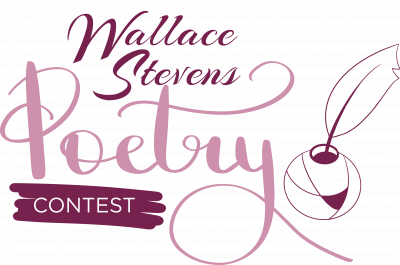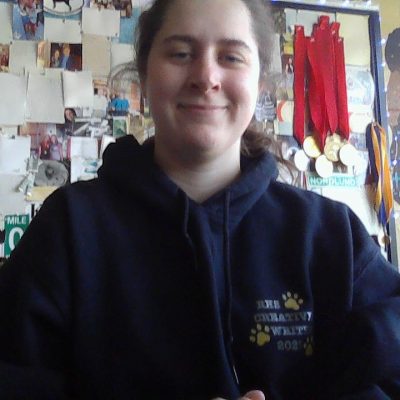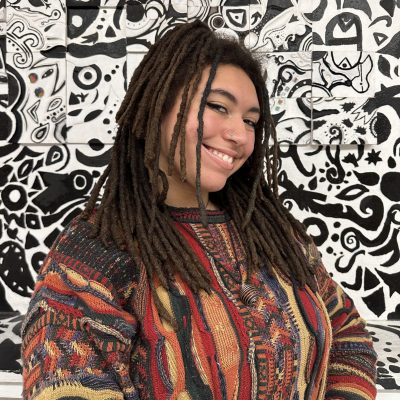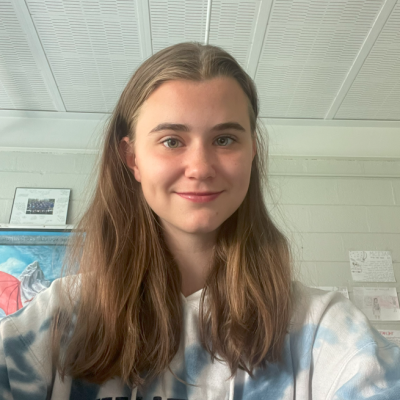By Sean Frederick Forbes, Ph.D.
Director, Creative Writing Program
UConn English Department

When I learned that the theme of this year’s ECE summer magazine was going to be “Growth Mindset: Challenging the Status Quo,” I nodded in approval. For any writer, especially a poet, it’s important to consider the role that a healthy “growth mindset” plays in the writing process. Every time one writes a poem, an essay, a text message, or even a grocery list, one is learning to write all over again. Writing a villanelle requires an understanding of the way repeated alternating refrains and a specific end rhyme scheme are employed to convey a complex narrative to the reader/listener versus texting one’s sibling to ask for a huge favor which requires one to think about effective and persuasive phrasing. The writer adapts to the nuances and limitations of each writing form, and in turn, the writer is growing by questioning and challenging the norms set before them. It’s the poet’s exuberant curiosity coupled with the impulse to take risks that allows for creative thought and expression.
My fellow judges, Sophie Buckner and Dan Healy, (both PhD candidates in the English department and creative writers), and I selected three poetry packets by Grace Dehnel, McKena Clemons, and Natalie Crowley, as the first, second, and third prize winners, respectively. With almost 100 submissions for this contest, and no identifying information on each packet during the review process, our three winners all happened to be students from Rockville High School. This was very exciting to find out as Mrs. Nordlund, their Rockville High School instructor, was once a Summer Institute fellow for the Connecticut Writing Project housed in the English department at UConn and she’s also a poet herself.
During the reading and deliberation process, Sophie, Dan and I thought carefully and critically about the presentation of the poems in each packet. We considered the ways in which the speaker’s voice establishes tone, and the form and style employed, as well as many other factors. What was most telling to the three of us was that
these three poets were moved by their rumbustious desires to express themselves in poetic form, and for that we are eternally grateful.
In Grace Dehnel’s poem “Air,” the speaker presents the denotative meaning of the word “free fall,” and takes on the typography that one would expect to find in an online or print dictionary such as a phonetic pronunciation guide, the part of speech of the word (“free fall” is a verb), and the word’s meaning. Typographically, the poem’s layout is a free fall-esque form that can unsettle the reader ever so slightly. This innovative decision allows the speaker to present a narrative voice to the reader in a most provocative manner with lines such as “A gravitational pull--/ intangible & untouchable & yet/doesn’t let you leave does it?” What’s most striking in these lines are the ways in which spacing, notably the large gaps within a line, create a tension within the narrative presented since the speaker breaks free from the constraints of traditional poetic line and stanza breaks expectations.
McKena Clemons’ poem “The second month” astonishes the reader with its use of a spare aesthetics juxtaposed with deep-rooted cultural and historical stings about the month of February. In the first few lines, the reader is symbolically exposed to the natural elements associated with a wintery climate—the chilled air, the dead trees, and the muddy slush of too much snow and sometimes rain. Clemons then ends the poem with three thought-provoking lines for the reader to ponder over: The streets are flooded with red hearts but they didn’t leave blood stains. / The shortest month dedicated to love and black bodies. / February is hypocrisy.” These lines can lead the reader to be contemplative and inquisitive about how some months in a calendar year can induce such deep thinking.
Natalie Crowley’s poem “Maybe it’s the Maybelline” the speaker confronts feminine beauty standards based on the cosmetics industry and the emotional, physical, and psychological affects and effects of applying mascara to one’s eyelashes. In the first few lines, the speaker informs the reader that in 1872 the first commercial mascara was created: a mixture of “petroleum jelly and coal dust.” In doing so, the reader becomes fixated on the human eye and the drastic and harmful “lengths” one takes in wanting to have alluring-looking eyelashes: “Sneaking into my sister’s makeup. / I used her mascara. / Got a cyst on my eye.” As one continues to read Crowley’s poem, one engages with the speaker on multiple levels in a succinct yet profoundly substantive style of voice.
Listen to Poetry readings
Grace Dehnel
 Grace Dehnel is a junior attending Rockville High School and is enrolled in the creative writing program. She enjoys writing poetry and is a Sunken Garden finalist.
Grace Dehnel is a junior attending Rockville High School and is enrolled in the creative writing program. She enjoys writing poetry and is a Sunken Garden finalist.
My ECE courses have allowed me to gain a new understanding of the world and see things through different lenses. With my pieces, I thematically and structurally explored the four elements of nature.
I love poetry because it allows me to explore the dark side of human nature through the use of metaphors.
Air
free fall
/ˈfrē ˌfôl/
verb
“to move under the force of gravity only; fall rapidly.”
Vertical descent--
I was weightless.
My body began rapidly
approaching the ground--
reaching its terminal velocity.
Time is impermanent & I
wondered who it was going to take next. [Was I the one chosen on Time’s waitlist?]
A gravitational pull--
intangible & untouchable & yet
doesn’t let you leave does it?
My body steadily becoming limp.
My eyes feel dry, my mouth arid & my
arms sting from the harsh gusts of air
that tear at my skin. [Razor blades]
I think I’ve accepted that this is it for me--
Perhaps my body will become a cloud
& overlook the sky--
Transitory clouds
do not have worries or fears.
I feel my body shutting down--
My eyes unfocus as I stare at the sky
littered with clouds--
I see nothing anymore [Dead before I had hit the ground.]
McKena Clemons

McKena Clemons is a Junior at Rockville High School where she is on the Varsity Golf Team. McKena is a proud advocate for social and environmental justice.
Sophomore year of high school I dealt with the transition of growing into my skin and where I fit socially. I began writing poetry which helped me grow and continue to grow into a better artist, activist, and a better person.
I have taken two ECE UConn classes and they both have been my favorite. The classes are challenging but I know they have prepared me for college.
My poetry has always been a tool so I could express myself. Throughout my poems there are themes of racial identity, gender identity, and coping with difficult moments in life as a child.
The second month
The air is chilled but days are warm.
The trees are dead but they dance in the wind more.
The pure white snow is nothing but a muddy slush.
The ground is frozen but grass still grows.
The weatherman promises just rain but no one is surprised by snow.
The month is second to all and first to some.
The streets are flooded with red hearts but they didn't leave blood stains.
The shortest month dedicated to love and black bodies.
February is hypocrisy.
Natalie Crowley
 Natalie Crowley is a junior at Rockville High School and is a member of the creative writing program. She enjoys painting and is a part of the lacrosse team at her school.
Natalie Crowley is a junior at Rockville High School and is a member of the creative writing program. She enjoys painting and is a part of the lacrosse team at her school.
Poetry has allowed me to express my opinions and commentate on issues in an artistic way.
My UConn ECE experience has given me a broader perspective on United States history as well as current social and political issues.
My poetry addresses my own experiences in the school system as well as how creativity is suppressed in modern education.
Maybe it’s the Maybelline
In 1872, the first commercial mascara was created:
Eugene Rimmel’s plumping serum--
a formula consisting of petroleum jelly and coal dust.
A rite of passage for middle school girls.
Cheap drugstore Maybelline,
pulled over lashes,
over and over,
until the hairs clumped together--
Just like how those girls stick together,
traveling in packs that I pretended to hate.
I wanted to be more like them.
Sneaking into my sister’s makeup.
I used her mascara.
Got a cyst on my eye.
I will never do that again.
It was like the Universe told me,
No, it’s not your time yet.
I settled for an eye lash curler and Vaseline.
I am jealous of those girls now.
When the tiny bottle and wand don’t fit in my hand,
I try over and over.
Black smears on my fingertips,
a constant reminder of who I am not.
Uneven, stuck together–
I practice at night instead of studying. I’ll do it in the morning.
The mascara weighs my eyes down in class.
I’m fighting sleep as I watch those wide-awake girls
Is there a HIIT for eyelids?
No one looks at me differently.
No one looks at me.
I wonder if Mr. Rimmel is a scam artist.
Do guys even like it?
Do I even like it?
Sitting in my chair with a test
I barely passed--
I let my finger run over the still wet ink--
my fingers coated in another layer of black.